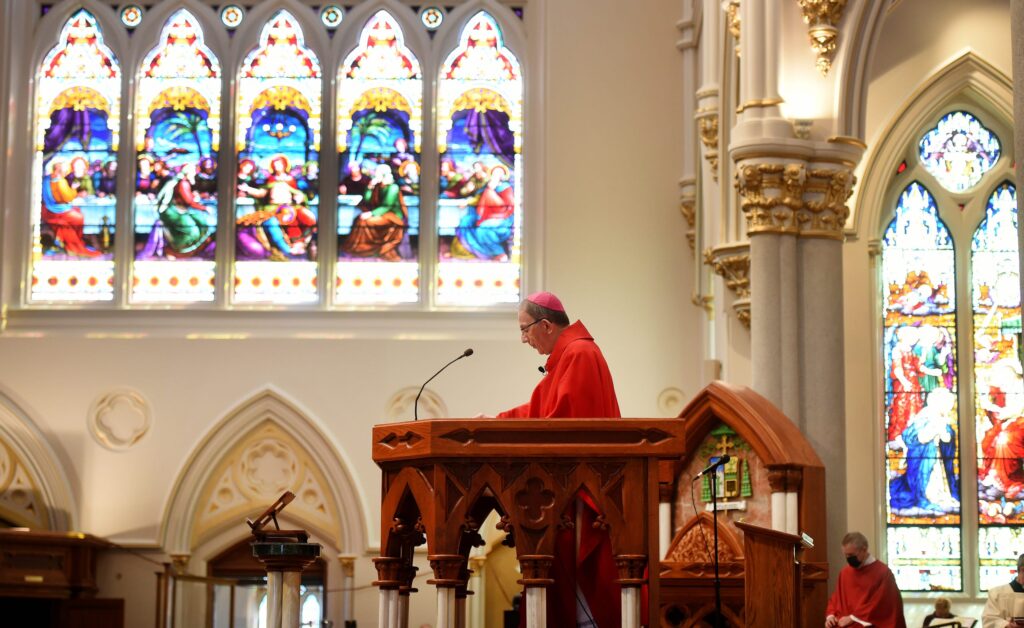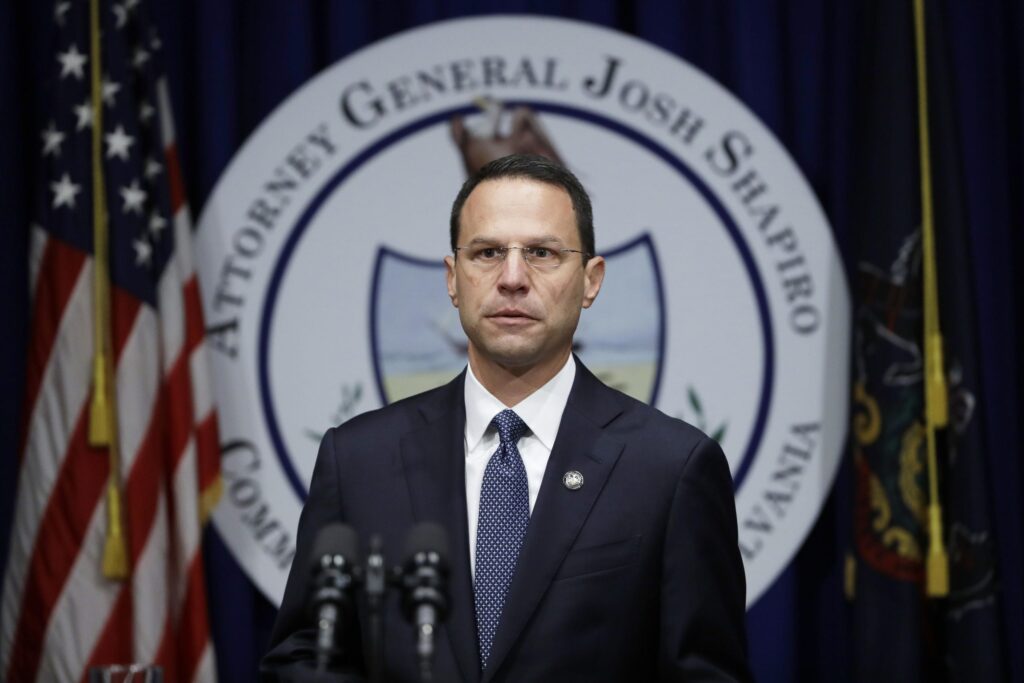ERIE (PA)
Erie Times-News [Erie PA]
May 22, 2021
By Ed Palattella
After announcing Catholic Diocese of Erie fund paid victims $16.6 million, Bishop Persico says diocese awaiting decision in Pa. Supreme Court case. Bankruptcy possible, depending on ruling.
With its latest report on the clergy abuse crisis, the Catholic Diocese of Erie said it has spent more than $31 million compensating victims and survivors and investigating cases.
Whether the financial reckoning continues, and whether the 13-county diocese will have to consider bankruptcy as a result, depends largely on how the Pennsylvania Supreme Court rules on a clergy abuse case that originated in the Catholic Diocese of Altoona-Johnstown.
“We are going to have to wait and see,” Erie Catholic Bishop Lawrence Persico said.
In releasing the latest figures on the abuse cases on Tuesday, Persico told the Erie Times-News that the Catholic Diocese of Erie would be in a precarious financial situation if the state Supreme Court were to rule against the Catholic Diocese of Altoona-Johnstown in the case, in which the plaintiff is named Renee A. Rice.
A ruling for Rice would open courthouses across the state to lawsuits over clergy sexual abuse in old cases.
The Republican-controlled General Assembly has prevented such cases due to its failure to pass legislation that would provide a two-year window for victims and survivors of abuse to sue over claims that otherwise would fall outside the statute of limitations. The administration of Democratic Gov. Tom Wolf also set back the push for changes by botching the process to get a constitutional amendment authorizing the two-year window on the ballot in the May 18 primary.
The lack of such a look-back law has insulated the Catholic Diocese of Erie and the other seven Roman Catholic dioceses in Pennsylvania from facing potentially costly lawsuits.
Instead, in response to the devastating August 2018 grand jury report on child sexual abuse in the Roman Catholic Church statewide, the dioceses created independent compensation funds for victims of abuse.

The funds provided payments to claimants — a total of $16.6 million to 134 claimants in the Catholic Diocese of Erie, as Persico detailed on Tuesday — while allowing the dioceses, rather than a judge or jury, to set the amounts. The Catholic Diocese of Erie released the latest figures to mark the end of the compensation fund, whose independent administrators fielded claims for six months in 2019 and then investigated them.
Persico said the fund also allowed the diocese to compensate victims while allowing it to remain financially viable, continue its ministries and stay out of bankruptcy. Claimants who received payments agreed to take no further legal action against the diocese.
A ruling for victims in the Rice case would allow claimants who did not receive payments from the compensation fund to sue, setting up a situation in which a judge or jury would decide how much a plaintiff would receive.
‘It has me concerned’
The Catholic Diocese of Erie at one point was facing more than 30 suits whose outcomes hinge on a ruling in the Rice case.
If those cases advance, Persico said, the Erie diocese would have to litigate or settle them with no help from its insurers and with few or no liquid assets. He said the diocese’s tight financial situation is due to how it secured a line of credit to make the $16.6 million in payments through the compensation fund.
Without even knowing how the state Supreme Court will rule in the Rice case, but concerned about the potential ramifications of a decision, the Catholic Diocese of Harrisburg filed for bankruptcy in February 2020. It is the first and only of the state’s Roman Catholic dioceses to file for bankruptcy.
Persico referred to the Harrisburg diocese’s bankruptcy filing when he discussed the Catholic Diocese of Erie’s financial condition in light of the amounts it has spent on the abuse cases so far. The total of $31.35 million includes the $16.6 million in payments through the compensation fund as well as legal fees and investigative costs. Insurance did not cover the costs.
“Right now we are stable,” Persico said. “But if the Rice cases come down in favor of the victims, well, that is going to be another story. It has me concerned for the financial health of the diocese.”
Persico said the diocese’s investments are already locked up as collateral for the line of credit it obtained to make the payments through the compensation fund, though the diocese has not revealed the size of its assets.
“Some of the victims could come back now,” Persico said of a potential ruling in the Rice case. “It is going to be harder for us, because all of our assets are tied up.”
“There is not real wiggle room,” he said.
The Rice case
In the Rice case, the plaintiff, who has allowed her name to be used by the news media, said her childhood priest abused her in the 1970s and 1980s. But Rice’s suit focuses on a cover-up she said the Diocese of Altoona-Johnstown engaged in for decades.
A three-member panel of the state Superior Court in June 2019 ruled the suit can proceed over the cover-up claims, despite the expiration of the statute of limitations for suing over her abuse allegations alone.
The court said a jury, rather than a judge, must be allowed to evaluate Rice’s contention that she could not have reasonably sued the Diocese of Altoona-Johnstown sooner because she did not know about previous allegations against the priest.

Rice said she learned of the allegations after reading a separate state grand jury report about the Diocese of Altoona-Johnstown released in May 2016. Rice is claiming, among other things, fraudulent concealment and civil conspiracy.
The state Supreme Court heard oral arguments in the Rice case in October. As is the norm, the court has issued no timeline for when it might rule.
‘There is a cost to it’
Rice’s lawyer is Richard Serbin, who practices in Altoona and is widely known for representing clergy abuse victims. He said he filed one of the Rice-related suits against the Catholic Diocese of Erie, and said he filed at least a half dozen suits statewide. Pennsylvania’s Roman Catholic dioceses have been hit with about such 150 suits, according to the Associated Press.
If a diocese files for bankruptcy, Serbin told the Erie Times-News, a federal judge would ultimately sign off on how much abuse victims would receive while the diocese reorganizes it debts to stay solvent and in business. He said the diocese would not cease operations, but would have to disclose its assets, which would give abuse victims leverage as they negotiate settlements — an advantage not available to claimants who went before the compensation fund.
Serbin said bankruptcy, or the prospect of it, is an outgrowth of the clergy abuse scandal and the Catholic Church’s willingness to cover it up for so long.
“There is a cost to it,” Serbin said. “But this was a sad chapter. It’s a situation they created.”
He also said, “I feel no sadness for the leaders of these dioceses who created the situations they are now dealing with, given that they were responsible for deciding to protect known sexual abusers and ignore the devastation suffered by innocent children.”
No end forthcoming
In the Catholic Diocese of Erie, Persico has made addressing the abuse crisis a primary task since he was named bishop in 2012, succeeding Donald W. Trautman, the bishop of the diocese since 1990.
In advance of the 2018 grand jury report, Persico authorized the release of a list of clergy and laypeople who had been credibly accused of child sexual abuse and other improper behavior with minors. The creation and publication of the list broke from past practice locally and nationwide.
In releasing the updated abuse-related financial figures on Tuesday, Persico said he was continuing to fulfill his pledge to be transparent about the abuse crisis. He said the effects of the crisis, including the potential effects of a ruling in the Rice case, are far from over.
“I don’t think I will see the end of this in my tenure,” said Persico, 70, who is expected to offer his resignation in five years under Vatican rules for bishops who turn 75. “This will be with us.”
Contact Ed Palattella at epalattella@timesnews.com. Follow him on Twitter @ETNpalattella.
